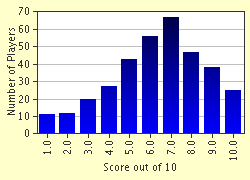Quiz Answer Key and Fun Facts
1. Imagine a world where the second law of thermodynamics was reversed, and entropy is no longer a thing to fear. Objects no longer wear down with continued use; instead, using an object will make it better! Axes become sharper as they cut down more trees, and clothing becomes finer the more it is worn. Which author imagined such a world in 1984's 'The Practice Effect'?
2. In one of his short stories, Isaac Asimov described a world surrounded by 6 (!) stars. With so many stars, one of them is almost always in the sky, and night comes but once in a thousand years. What would a people do, upon their first sighting of thousands of points of light in the sky? In which 1941 story did Asimov attempt to answer this question?
3. In what classic 1953 Ray Bradbury tale does he raise the idea of a fireman whose job is not to put out fires, but to start them?
4. What author's 'Guns of the South' (1992) features (in some editions) a cover picture of Robert E. Lee holding an AK-47?
5. Time travel is also examined in 'Pastwatch: The Redemption of Christopher Columbus'. Which author describes a group of men and women determined to change the events of 1492 in 1996's 'Pastwatch'?
6. In what novel by Kurt Vonnegut does he raise the possibility of an as of yet undiscovered, form of water, terming it "Ice-nine"?
7. In what 1966 Philip K. Dick short story does he suggest the idea of a company that can (for a fee) implant memories that are even better then the real ones, including a certain special one about a secret agent on Mars?
8. Robert Heinlein wrote a series of stories based around the premise that longevity is genetic. By a selective breeding program and a great deal of patience, one could eventually have humans living far beyond a normal life span. What novel tells the story of the longest lived of these children of Methuselah, Lazarus Long?
9. What work of Larry Niven tells of an exceedingly large artificial planet of a peculiar shape "orbiting" a star?
10. Finally, we go a bit further back (a century or so). What author's 1865 'From the Earth to the Moon' described the launching of a rocket containing 3 men (from Florida no less!) in an attempt to win the international space race to put the first men on the moon?
Source: Author
kevinatilusa
This quiz was reviewed by FunTrivia editor
Bruyere before going online.
Any errors found in FunTrivia content are routinely corrected through our feedback system.

